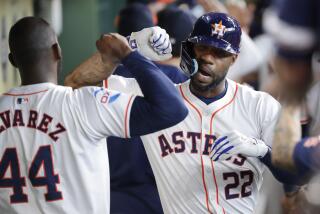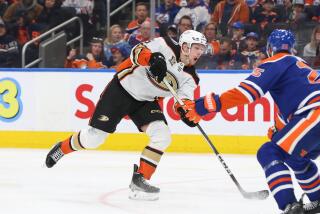Mighty Ducks ‘95-’96 : Hayward Keeps Viewers Plugged In to the Action : Television: Player-turned-analyst’s experience, humor come through clearly.
- Share via
If they gave out a Calder Trophy for broadcasters, Brian Hayward would have been eligible when he was hired as color analyst for the Mighty Ducks’ television broadcasts in 1993.
In the NHL, you’re still officially a rookie until you have 25 games under your belt. Hayward had spent 376 games in front of an NHL net, but only about eight in front of a camera, all as a fill-in on San Jose Sharks’ games after a back injury hastened the end of his playing career.
A goaltender once good enough to split the work in the Montreal Canadiens’ nets with Patrick Roy and reach the Stanley Cup finals twice, with Montreal in 1989 and Minnesota in 1991, Hayward quickly proved to be a rookie-of-the-year caliber broadcaster.
“His future is unlimited in this industry,” said Lisa Seltzer, director of broadcasting for the Ducks and a veteran NHL director. “I think he can do whatever he wants.”
Hayward is as polished and natural on the air as a career TV analyst, and early on he was at ease talking to the blank stare of the lens. He adapted quickly to the difficulties of television, learning to manage the incredible distraction of having a director talk into his earpiece as he discussed the game.
Maybe more important, he proved an unusually adept analyst, teamed with play-by-play man Chris Madsen. Hayward’s comments are insightful enough that knowledgeable fans are always learning from him, but still accessible enough that neophytes aren’t hopelessly lost.
“I consider myself an analyst more than a color man,” Hayward said. “A color man to me is a guy who tries to be entertaining. I try to focus on the things I find interesting about the game, and handle the analysis. That’s what John Davidson does, who I consider to be the best at this. You figure out what you can analyze or explain.
“It’s not just the power play is five for its last 10, but what they’re doing right, why they’re playing particularly well or why they’re struggling, what needs to be done. That’s the part I’ve always found interesting about the game, more so than the score.”
Hayward has always believed he understood the game better than most, and part of that comes from being a goalie, used to watching the action and shouting directions to defensemen. It’s probably no coincidence that a number of successful analysts are former goalies--such as Madison Square Garden and Fox TV’s Davidson and ESPN’s Darren Pang.
Hayward also has a light touch, maybe demonstrated best when a Ducks’ game against Detroit at The Pond last season ended in a towel-tossing flare-up between Duck Coach Ron Wilson and the Red Wings’ Scotty Bowman, a Hall of Famer.
Hayward went to the telestrator.
“Check out the follow-through on Scotty Bowman,” he said, drawing an arrow to Bowman’s outstretched arm after he flung a towel toward Wilson from the Red Wing bench, angry over jawing between the Ducks and Dino Ciccarelli.
Then Wilson went for the towel, but his attempt at retribution would be foiled. Hayward, ever the analyst, told viewers why.
“Look out, folks,” he said, circling the glass panel between the benches. “The partition in the middle is going to block the throw.”
By the end of his second season, Hayward’s ability had been noticed by Molstar Communications, which hired him as an analyst for their Hockey Night in Canada broadcasts on the Canadian Broadcast Corp. He did the first-round playoff series between the Sharks and the Calgary Flames, then the second-round series between the Sharks and the Detroit Red Wings.
“Hockey Night in Canada is something I’ve watched all my life. That was tremendous,” Hayward said. “It’s an institution in Canada. It leads the ratings every year and it has for the past 40 years. It’s a big deal, the Monday Night Football of Canada.”
Between Duck broadcasts this season, he might do an odd game or so for Hockey Night in Canada, and after the Ducks’ season ends, he’ll almost certainly be involved with more playoff coverage. ESPN also called last postseason, though Hayward had already committed to CBC.
Hayward, 35, played 11 seasons in the NHL, first with Winnipeg and then in Montreal, where he and a young Roy shared the job at first, and Hayward led the NHL with a 2.81 goals-against average in 1986-87. But in 1990, Roy signed a contract that made him the first million-a-year goalie, and Hayward knew he would be relegated to backup.
“There was no point in staying when they were paying this guy a million dollars. I knew I’d play maybe 15 games and I wanted to be the No. 1 guy,” said Hayward, who signed a new contract with the understanding he would be traded, then found out the team had changed its mind.
“I ended up walking out,” said Hayward, who refused to play until he was traded. “A lot of people say, ‘Why did you do that?’ But I felt I had to force a trade. I knew it would be a tremendously frustrating experience. I felt it didn’t matter how well I played or what I did, I wasn’t going to be playing.”
Eventually he was traded to Minnesota--just in time for the Stanley Cup finals--and later become property of the Sharks, where he suffered a herniated disk in the team’s first season.
“Sometimes I wonder if I would have injured my back playing for a good team. With an expansion team, you tend to be diving around a little more than you otherwise would be,” said Hayward, once again the analyst.
His transition to TV has been smooth, which is not to say it has been flawless.
For example, you’d think that an ex-goalie would be sensitive and use the phrase “between the pads” or “the five-hole.”
Instead, Hayward said on the air that “if Mikhail Shtalenkov has a weakness, it’s between his legs.” That one hasn’t been forgotten.
“He’s not afraid to laugh at himself,” said Seltzer. “If he gets tongue-tied, he goes ahead and laughs at himself.”
Hayward has succeeded partly because he has avoided many of the pitfalls that befall former players on the air.
“They say we, us and them,” Seltzer said. “They personalize it instead of being more removed. Especially if they’re broadcasting games of the team they played for. They still have personal relationships with the players and they’re too emotional. The situation for us was different; obviously no one had ever played for the Ducks before.”
But until this season, Hayward literally was part of the team, not only as an employee of the Ducks as the other broadcasters but as a part-time coach and goaltending consultant.
‘[Club President] Tony Tavares made it very clear that he didn’t want me to protect anybody, that if somebody doesn’t do something right, you talk about it. That’s your job,” Hayward said. “I was very happy to hear that, because I don’t think you can fool anybody at home.
“I think as long as criticism is impersonal and justified, in my mind there’s never a problem with it. That’s the way I felt as a player. You can deal with it as long as it’s justified and not personal.”
With his reputation spreading, Hayward is likely to get more offers. He has given up coaching and gone free-lance with the Ducks, but contrary to what you might expect, he’s not ready to jump at the first full-time network offer he sees.
I really like working for a team,” he said. “I’ve got a 5-year-old girl and if you’re doing one team, the travel is cut in half. If you work for a network and do 60 games, that’s 60 road games. I’m quite happy here.”
More to Read
Go beyond the scoreboard
Get the latest on L.A.'s teams in the daily Sports Report newsletter.
You may occasionally receive promotional content from the Los Angeles Times.






